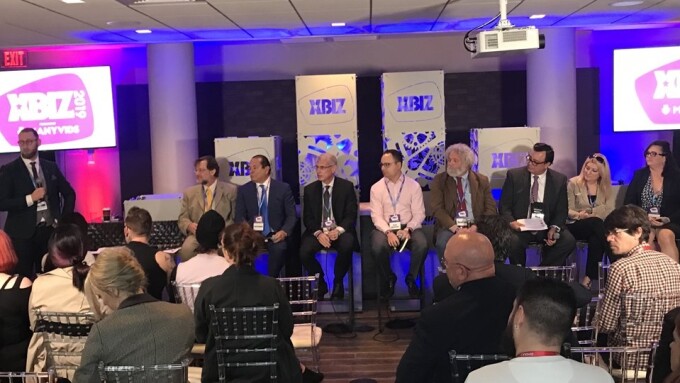WEST HOLLYWOOD, Calif. — For those interested in the adult entertainment industry’s legal landscape, as well as its regulatory challenges looking ahead, the 2019 XBIZ Show and its companion Free Speech Coalition Leadership Conference provided welcome education about the issues that matter most.
A cornerstone of every XBIZ conference, the eight-member legal panel at XBIZ Show presented capsule summaries and opinions of the most pressing legal issues facing the global adult entertainment business.
Involved in the XBIZ Show discussion, called “Legal Landscape: A 2019 Snapshot,” were industry attorneys Lawrence Walters, Corey Silverstein, Karen Tynan, Reed Lee, Paul Cambria, Maxine Lynn, Jeffrey Douglas and Nick Zargarpour.
The FSC Leadership Conference, meanwhile, offered up four monologue presentations in a day-long affair.
Speakers at the FSC conference included J. Michael Murray, lead counsel in the suit against 2257 regulations; G2’s Dave Landis, who spoke on new banking and billing regulations; Lambda Legal’s Scott Schoettes, who spoke on HIV discrimination law; and Murray Perkins, of the British Board of Film Classification, who provides an update on the U.K.’s new age-verification regulation that is scheduled to take effect in April.
All of the seminar events took place at the Andaz hotel in West Hollywood, Calif., the host venue for the 2019 XBIZ Show, which was held Jan. 14-18.
2019 XBIZ SHOW
‘Legal Landscape: A 2019 Snapshot’
The panel discussion “Legal Landscape: A 2019 Snapshot,” moderated by the FSC’s Eric Paul Leue, hit upon some key topics that all of those in the industry should be concerned about.
Douglas, who also is the FSC’s board chair, spoke about the adult trade group’s near-decade-long fight over 18 U.S.C. §§ 2257 and 2257A, the adult-producer recordkeeping regulations. The organization, over the years, has sought to have the laws found unconstitutional.
“It’s a landmine that’s out there,” Douglas said. “There is risk for everyone in the adult industry who is not in compliance.
“Under the guidance of J. Michael Murray and Lorraine Baumgartner, the FSC took up the challenge and have shown extraordinary, remarkable results. The law has been gutted by the trial court and by the 3rd Circuit guiding the trial court.
“So, there is very little left of the requirements. The most significant is that the inspections were struck down by the Fourth Amendment — about search and seizure — and the recordkeeping has largely been struck down as a violation of the First Amendment.
“The trial litigation is now over and the entire package is going up to the 3rd Circuit for their determination. We are optimistic that the 3rd Circuit will rule in our favor. [In the long term], the question, if it comes to that point, is whether the Supreme Court take up a stricken statute.”
Douglas said that despite the FSC’s court victories in regards to 2257, producers need to make sure that they continue to comply with 2257 regs.
In other topics, Walters spoke about one of the biggest recent threats to online adult commerce in recent years, one that was designed to stamp out so-called sex trafficking.
The adult entertainment attorney, representing the Woodhull Freedom Foundation and other plaintiffs, is attempting to block enforcement of the draconian online law known as FOSTA.
The plaintiffs got their first chance at an injunction over the new law with a federal judge; however, that judge told the plaintiffs they lacked standing. And now the case has been sent to a federal appellate court for a review.
Woodhull and the other plaintiffs contend the law amending Section 230 of the Communications Decency Act, which previously provided companies immunity from most liability for publishing third-party content, violates the First and Fifth Amendments.
Since FOSTA was signed into law by President Trump, numerous adult websites have been severely affected by the measure's intention to outlaw prostitution advertising.
Many portals have closed up shop in entirety, and others have pared their hookup classified advertising sections.
“It is really a mess, and there are a number of constitutional problems with [FOSTA],” Walters said. “It has made a tremendous chilling effect on the dissemination of protected speech. The law is defective in numerous ways and it is unconstitutional and overbroad.”
Walters explained that not only has the chilling effect hit adult sites but even mainstream ones as well. And, he also noted, he’s even gotten queries from site owners who promote such sites wondering if they could be prosecuted under the law.
“We think the district court was wrong that we lacked standing,” Walters said. “So, we’re in a court that we need to be in.”
Tynan, who focuses her practice on labor law and the adult biz, discussed a big change in California labor law in regards to independent contractors under state Supreme Court case called Dynamex, which was anticipated as a chance for the courts to examine the “gig economy” and re-examine the legal standards for evaluating the age-old question — “employee or independent contractor?” The question is oft repeated in the adult entertainment biz.
Tynan said that in the Dynamex case, the court embraced a more rigid test than the past, looser standard for determining whether a worker is an employee or a contractor.
Tynan said the big takeaway in the case is that employers need to follow the so-called ABC test, which requires the employer to establish three factors to show a worker is an independent contractor: “That the worker is free from the control and direction of the hirer in connection with the performance of the work, both under the contract for the performance of such work; that the worker performs work that is outside the usual course of the hiring entity’s business; and that the worker is customarily engaged in an independently established trade, occupation or business of the same nature as the work performed for the hiring entity.”
“Under California’s new ABC standard, the hiring entity is required to establish the existence of each of the three parts of the ABC standard,” Tynan said.
“Now, we have a three-prong test that is likely retroactive; there are two bills in the Legislature that are pending to make some slight adjustments or codify it. But, basically, with the new law the only one who can be an independent contractor is the plumber that comes to your house.”
Tynan continued, “And just so you should know there is another bill in Sacramento at the Legislature that would extend the statute of limitations on sexual harassment to three years from two years.”
In other discussions, Silverstein spoke about the GDRP, or General Data Protection Regulation, that took effect in May. The rule, imposed by the European Union, provides internet users rights on the collection, use and disclosure of personal data. Silverstein discussed why adult sites should comply with the law.
Lynn, who focuses her practice on intellectual property and other matters in the adult space, discussed a recent decision by the U.S. Patent and Trademark Office to deny trademark registration to the clothing line called Fuct.
“The case is going to the U.S. Supreme Court,” she said. “The court will decide whether trademark protection can be refused to brands that the federal government finds vulgar or lewd.”
Last year, she noted, the U.S. Court of Appeals for the Federal Circuit ruled for Fuct and struck down the ban on protecting “scandalous” and “immoral” trademarks as a First Amendment violation.
She said that adult companies should follow the case, which centers on Section 2(a) of the Lanham Act. That code lists several kinds of trademarks that the U.S. Patent and Trademark Office can’t register, including a trademark that consists of or comprises immoral, deceptive or scandalous matter.
FSC LEADERSHIP CONFERENCE
‘Age Verification in the U.K.’
The U.K.’s age-verification rules under the Digital Economy Act are set to go into effect by springtime, and the stakes are high for adult businesses that don’t comply with the new rules.
Murray Perkins, who leads efforts for the U.K.’s new AV regulatory regime under the Digital Economy Act, the BBFC, discussed the final rules as they stand, how businesses are supposed to comply and what will happen to businesses that don’t in a presentation aptly titled, “Age Verification in the U.K.”
Perkins, who spoke at the FSC Leadership Conference previously in 2018, offered more details about how the BBFC intends for AV to work in the U.K., as well as how it might play out for commercial operators outside of the country.
Mastercard, Visa and PayPal, among other ancillary third-party partners to adult sites, have pledged to go along with the new system in place. Those financial institutions could be asked to withdraw services from noncompliant websites. So have ISPs and mobile operators, Perkins said.
The average U.K adult supports age-verification of some form or fashion, Perkins said, and that is why the Digital Economy Act was enacted and soon to be enforced.
Soon, conforming sites will have the AV certification symbol showing up on pages.
“The guidance sets out a specific set of requirements for AV controls,” he said. “It is not just date of birth. It’s a system that needs to be really robust; however, we realize that no system is ever 100 percent [foolproof].”
Perkins went on to roll off the criteria for AV standards: An effective active control mechanism at the point of registration or access to adult content by the end user that verifies that the user is aged 18; use of AV data that cannot be known by another third party; and inclusion of measures that authenticate the AV from a non-human operator.
“There’s also a requirement that either users age verify each visit or restrict access only to those who opted for the login information to be remembered,” Perkins said. “We want to ensure consumers that AV providers offer a high standard of security with their data. There must be a level of trust.”
Perkins told the audience that the BBFC’s plan to make the Digital Economy Act work means that the regulator must work with nonconforming sites to get the desired results.
He noted that the BBFC, as AV regulator, has a reporting mechanism for noncompliant sites and that staff “will follow traffic closely.”
“We will make contact with noncompliant services before we take action,” Perkins said. “And the process will take weeks not months, so that, among other reasons, we have compliance across the board.”
Easter was the proposed date that enforcement was to be begin, Perkins said.
“But we don’t have a specific date yet,” he said. “Currently there are numerous firms up and running that are offering AV services. This is such a big ticket for government; we want to make sure consumers are protected and high standard are adhered to.”
Those protections and high standards include a third-party audit to ensure AV providers comply with strict privacy and data security requirements standards above and beyond GDPR, said Perkins, who noted that the new system will have a transparent framework and all results published to the BBFC’s AV website.
That transparency, Perkins emphasized, “ensures consumer confidence in AV and therefore it ensures no commercial incentive to avoid compliance with the law.”
Other frontiers for AV could be on the horizon as well, Perkins said. His office has had discussions with government officials in Poland, Sweden, Australia, France, Spain and France, as well as Canada, Denmark and the U.S. regarding the U.K.’s AV system, he said.

‘Sex, HIV and Videotape: How Nondiscrimination Law Will Shape the Future of Sex Work’
Lambda Legal Senior Attorney Scott Schoettes delivered an enlightened talk on HIV rights at the workplace.
Civil rights group Lambda Legal has played a role in many legal cases pertaining to sexual liberties rights, including the U.S. Supreme Court ruling Lawrence v. Texas, which invalidated sodomy laws in the U.S.
“We are a national organization committed to achieving full recognition of the civil rights of lesbians, gay men, bisexuals, transgender people and everyone living with HIV through impact litigation, education and public policy work,” said Schoettes, explaining Lambda Legal’s mission.
"We select cases that will have the greatest impact in protecting and advancing the rights of LGBT people and those with HIV. We lead high-impact public education campaigns, like this one right here, to help people exercise the rights they have and to build public support for equality, and we advocate for public policy at the local, state and federal levels to improve the lives of LGBT people, people affected by HIV, and their families and allies.
“We’ve been in this fight from the very beginning, and I’m proud to say that,” he said. “Some groups, which I won’t mention, have dropped out of the fight.”
Schoettes, who told audience members that he is HIV-positive and has been for the past 20 years, said that misinformation about HIV, specifically risks during sex, has been a predominant theme through the years and that science and numbers reveal the truth of what goes on.
“The biggest predictor for HIV is income,” he said. “When you place blame on HIV, it is anal sex. It is by far riskier — 13 times — than receptive vaginal sex.”
PrEP, however, has changed the playing field when it comes to HIV.
“It is a different world today with PrEP,” Schoettes said. “A person who is HIV negative but at higher risk than average for contracting HIV can take two HIV medications in one tablet on a regular basis and by doing so greatly diminish the chance of acquiring HIV if exposed to the virus.”
Schoettes went on to discuss specific examples of HIV discrimination at the workplace, including several legal cases he’s working on involving those who are active or attempted to enlist in the military, among numerous others on his list.
Schoettes didn’t immunize the adult biz or its players from future legal claims regarding HIV at the workplace, however.
“Maybe the sex industry, broadly, might be next on the list,” he said.
HIV discrimination laws in the U.S. are mature enough to impact any industry, Schoettes said, including adult entertainment.
“There are laws on the book that you can’t discriminate against a person that is living with HIV,” he said. “Well, how do we make sure that we’ve integrated the industry in a way that we don’t discriminate against HIV performers? And then at the same time we want to make sure the industry is safe?
“And I know there is a sector of the industry that is working outside the PASS system,” he said. “And that is problematic because there is greater risk.
“And then there are those who don’t want to work with an HIV performer, who say, ‘I don’t care what the science says,’ ” he said.
“The law is going to look at science, and it is not going to care with those who say, ‘I don’t just want to work with someone with HIV.’ That is the basis of discrimination and not rooted in science.
“So, we now have the question of, how does the industry move along to make sure that performers living with HIV in the industry can be part of the industry before the law?” he asked. “Or do we let regulators move in?”
Fielding a few audience questions, Schoettes emphasized that the science of HIV is fairly clear and so are the laws.
For those performers who don’t want to book with certain performers, he said, “Maybe this industry isn’t your industry; maybe you shouldn’t be working in porn. In the public sphere there are expectations, and discrimination is not allowed in the workplace. Producers need to be careful of not facilitating the discrimination.”

‘Make No Mistake (Because It Could Be a Felony): The Case Against 2257 Still Matters’
Attorney J. Michael Murray, one of two attorneys who have lead litigation efforts on behalf of the Free Speech Coalition for nearly a decade in regards to the trade group’s lawsuit over federal recordkeeping laws, 18 U.S.C. §§ 2257 and 2257A, offered a status report on the case.
Last summer, U.S. District Judge Michael Baylson in Philadelphia found that large parts of the statutes were unconstitutional on First Amendment grounds. Baylson issued a judgment and decree over the regs.
An earlier FSC victory against the regulations on Fourth Amendment grounds came from a 3rd Circuit ruling.
Now, the case sits at the 3rd Circuit, where a panel of judges will determine Baylson’s First Amendment ruling on appeal from the Justice Department and cross appeal from the FSC.
At the seminar, Murray reviewed the past history of 2257, which carries a potential prison term of five years for violators, as well as past attempts to convict those distributing content in the adult industry so that adult industry members of the audience, many of whom were not aware of past First Amendment struggles, understood the business better.
Murray spoke of the Meese Commission, under President Reagan, which eventually issued a sprawling report in 1986 complete with its proclamations on the harms wrought by obscenity.
As a result of the report, a new legal toolbox was handed over to the Justice Department to intimidate and jail distributors of adult content. The 2257 statutes came in to play after the Child Protection and Obscenity Enforcement Act of 1988 was passed.
Murray, in his status report, said: “The FSC has really something that's remarkable, but it's not over.”
“The government has appealed, and we have cross appealed and I will be arguing for a fourth time at the 3rd Circuit sometime in the coming months,” he said. “After that, the case could be heading to the Supreme Court.
“In the meantime, it's important that distributors comply with the statute, because if it is ever upheld you don't want to be in the position where the government can go back and say that in 2018 or in 2017 you didn't comply if enforcement and prosecutions come back.
“I think the FSC needs to be commended for supporting this case in this never-ending struggle for First Amendment rights.”

‘The New Landscape for Banking Compliance’
Rounding out a full day at the FSC Leadership Conference, Dave Landis, G2 Web Service’s senior vice president of global sales, offered discussion on the newest card brand rules and Mastercard’s BRAM (business, risk, assessment and mitigation) requirements that affect online merchants.
At the top of the discussion on merchant compliance was Mastercard’s latest policy that aims to protect consumers against recurring charges that often catch customers by surprise.
Just a day prior, Mastercard announced that merchants would now be required to gain cardholder approval before they start billing at the end of a free trial for subscriptions for some physical goods.
In those cases, merchants will have to send the cardholder an email or text with the transaction amount, payment date and merchant name.
Additionally, for each payment, merchants will have to send a receipt to the cardholder for each new transaction, along with clear instructions on how to cancel the subscription.
An associate of Landis’ in the audience said that with the announcement Mastercard likely will focus on products like weight gain, hair gain and penis pills.
“Here’s a fact: 91 percent of the companies you see for medicine are rogue,” Landis said. “And those businesses face huge amounts of chargebacks.”
The new rule, Landis said, might take time to implement only because merchant associations typically take about a year to put in place formally.
Importantly, Landis emphasized that website owners should make sure that products on affiliates’ sites need to be reviewed.
“Know your affiliates. It’s like you are in collusion because you are providing the platform,” he said.
Landis, in conclusion, said that the online adult entertainment space is still an ideal place to do business but that some business freedoms have taken hold.
“There is no reason why you shouldn't process adult content,” he said. “It's good business but the reality is you want to make sure the card networks are not all over you. It's important for you to process, and you don't want all such card assessment.
“Back in the day it was a closed-loop system and you could process anything, and I mean anything, in all seriousness, but everything's changed.”
Landis’ company, G2 Web Services, offers processing mitigation services for adult websites. Some of G2’s clients include MindGeek, ManyVids and Clips4Sale.
To mitigate problematic instances with processors, Landis said, business owners need to get involved with billing before disaster occurs.
“Prove that you're doing the right thing, at the right time, and that you are actually monitoring your site and your affiliates’ site,” he said. “You want to stay alive, and you don't want to lose transactions.”








